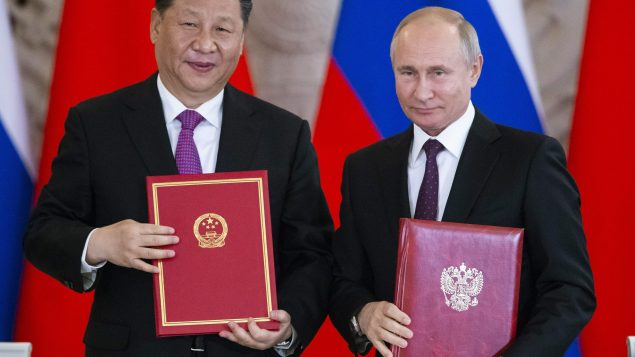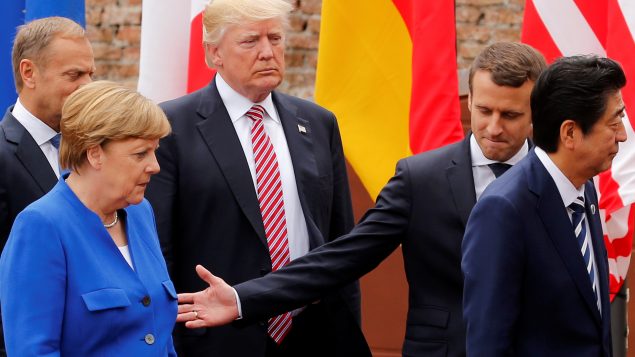Canada needs to be “clear eyed” about its own place in the rapidly changing multipolar world and the security challenges presented by such “revisionist” adversaries as Russia and China, says a former spy chief and national security advisor to two prime ministers.
The world is undergoing fundamental change and Canada cannot rest on its laurels at a time of rising global threats, including the increasingly isolationist United States, dysfunctional Western allies and the emergence of China and Russia, cyber threats and terrorism, Richard Fadden said in a speech to the Conference of Defence Associations Institute (CDAI) Friday.
Fadden, a former national security adviser to both Prime Minister Justin Trudeau and his predecessor, Stephen Harper, said Canada needs to take a hard look at itself to ensure it is ready to face this new reality.
“I want to stress that I am not criticizing any particular government or political party,” Fadden said.
“Rather, I hope my remarks will contribute to the ongoing debate involving academics, politicians, public servants, members of the media and pundits generally about Canada’s national security, which must include our foreign, defence, security, and international financial and trade interests.”
In fact, Canadians need far more public discussion of these issues, Fadden said.
Fadden said he analyses the national security challenges confronting Canada through the prism of four “meta-issues” – the rise of revisionist states, a dysfunctional West, the growth of violent radicalization and cyber threats.
Strategic adversaries

FILE – In this June 5, 2019 file photo, Russian President Vladimir Putin, right, and Chinese President Xi Jinping exchange documents during a signing ceremony following their talks in the Kremlin in Moscow, Russia. (Alexander Zemlianichenko, Pool, File/AP Photo)
Fadden identifies Russia and China as the two largest revisionist states, “which are prepared to use virtually any means – short of war – to attain their objectives.”
Some examples of such “revisionist” behaviour are Russian’s invasion and annexation of Crimea and its ongoing efforts to destabilize Ukraine, China’s massive world-wide intelligence gathering program or its activities in the South China Sea or its “diaspora” management program, Fadden said.
“The risks posed by these two countries are certainly different, but they are generally based on advancing all their interests to the detriment of the West,” Fadden said.
Their activities span the political, military and economic spheres, he added.
“Virtually no national security issue of importance – and many others – can be dealt with without taking into account the fact that these countries are not just aggressive competitors, they are our strategic adversaries,” Fadden said.
‘A dysfunctional West’

From L-R, European Council President Donald Tusk, German Chancellor Angela Merkel, U.S. President Donald Trump, French President Emmanuel Macron and Japanese Prime Minister Shinzo Abe walk after a family photo during the G7 Summit in Taormina, Sicily, Italy, May 26, 2017. (Jonathan Ernst/REUTERS)
Western countries, which in Fadden’s analysis include all of Canada’s NATO allies, as well as Australia, New Zealand, Japan, South Korea and Taiwan, along with a number of others, are dysfunctional for a couple of basic reasons.
“First, there is a turning away by some from the democratic ideals that should characterize us, towards right-wing authoritarianism with its frequent partners: excessive nationalism and a turning inward,” Fadden said.
“Second, a significant lack of global leadership on the part of the United States and an equal lack of ability or willingness on the part of the West’s traditional second tier countries – the United Kingdom and France and perhaps Germany – to fill the gap left by the United States.”
In addition, the West suffers from “a significant loss of coordination” in dealing with the Chinese and Russian revisionism, as well as with any number of other issues, Fadden said.
“This is not meant to be a rant against the current incumbent of the White House,” he said. “The U.S.’ retreat from global leadership started before 2016 and while Trump’s style is acting as an amplifier, we have to conclude that in the future the West will have to adapt to at least a much restrained U.S. approach to leadership.”
Violent radicalization

An Islamic State militant waves an ISIS flag in Raqqa, Syria. In December 2018, Ottawa estimated the number of Canadian extremists abroad at about 190. (Reuters)
The growth of radicalization to violence, most notably Islamist and right-wing extremism, presents another huge challenge for Canada’s and Western security, Fadden said.
While the West has won many battles in its “War on Terror,” the outcome of the war itself is far from certain, he said.
Western countries have spent billions and billions on anti-terror measures, yet, they have not managed to deal with the root causes of why many groups around the world continue to use terror as a means of advancing their agenda, Fadden said.
Terrorism is “alive and well” and is not going away soon, he said.
“The risk of massive attacks may be less than it was, but the risk of attacks is still there virtually everywhere on the planet and terrorism continues to succeed in one respect – it scares the living daylights out of people – it terrorizes – and is absolutely impossible for governments to ignore,” Fadden said.
“Right wing terrorism is growing and like its cousin jihadist terrorism, it is a globalized threat. We will ignore it at our peril.”
New cyber reality
Advances in artificial intelligence (AI), Internet and space technologies have created new opportunities and but also new threats in the world of cyber technologies, Fadden said.
Russia weaponized cyber tools to attack Ukrainian communications, command and control and other systems during the its invasion of Crimea and eastern Ukraine, without actually causing visible physical damage, Fadden said.
“If the disabling of communications systems had been accomplished by kinetic means it would have entirely changed the Russian operation and the West’s reaction to it,” Fadden said. “International law has yet to come to grips with this issue of significant damage being accomplished without physical damage – when does it reach the level of war as defined in international law?”
Cyber war becomes an easily useable tool to anyone wanted to make a point short of traditional armed conflict, he said.
Then there is the issue of countering cyber-espionage, including state-sponsored theft of intellectual property (IP), and cyber-crime.
It is estimated that IP theft amounts costs Western economies about a trillion dollars a year, Fadden said.
“This a major threat to both our national security and our economies,” he said.
The last cyber challenge identified by Fadden was cyber-propaganda, the use of the Internet or social media in one or other of its forms to spread an ideology or false information meant to recruit individuals to violence or to disrupt institutions.
The so-called “cyber prop” threatens the integrity of Western institutions and the ability of governments to act as misinformation narrows the range of actions the population will support or tolerate, Fadden said.
Lack of common threat assessment
Perhaps one of the greatest issues faced by the West is the lack of a common “threat assessment,” Fadden said.
“This issue is especially visible in Canada – we are surrounded by three oceans and the U.S. so we don’t really feel threatened when, in a totally globalized world that is unrealistic,” Fadden said.
“More than anything, we need to shed the blinders of the past and see the world and our place in it as it is. This is not a G-1 world so we need to stand on our own with values and ideas more than we have in the past. And, to do this we must bring to bear patience and consistency along with the resources to match.”







For reasons beyond our control, and for an undetermined period of time, our comment section is now closed. However, our social networks remain open to your contributions.